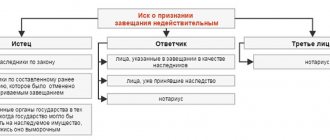Sword of Damocles of a Russian bankrupt: subsidiary liability
The Federal Tax Service of Russia appealed to the arbitration court with an application to bring the managers who controlled the limited liability company Metalglavsnab to subsidiary liability for the obligations of the debtor in the amount of 833,732,067 rubles 83 kopecks.
In support of the requirement to bring these managers to subsidiary liability, the authorized body referred to the fact that, according to information from Rosreestr, on the eve of bankruptcy and in the monitoring procedure, the Metalglavsnab company alienated all real estate belonging to it (92 objects in the Krasnodar region and 26 objects in the Irkutsk region). region), including on the basis of compensation agreements.
By decision of the Arbitration Court of the Krasnodar Territory dated December 29, 2015, the application was denied. By the decision of the Fifteenth Arbitration Court of Appeal dated April 11, 2018, the ruling of the trial court was left unchanged. The Arbitration Court of the North Caucasus District, by its resolution dated July 12, 2018, left the ruling of the first instance court and the ruling of the appellate court unchanged.
Canceling the judicial acts of lower courts and sending the case for a new trial, the Supreme Court of the Russian Federation, in its ruling dated February 25, 2019 No. 308-ES17-1634(5) in case No. A32-54256/2009, formulated the following conclusions:
1. “...Total sale of real estate goes beyond the scope of standard management practices used in ordinary business activities. Taking this into account, the courts should have been asked to disclose the plan they were implementing, the purpose of such a large-scale campaign to transfer major liquid assets to other persons, including those affiliated with the debtor, and the expected result of the implementation of this plan. The courts did not take such actions.”
2. “The mere fact that earlier tax audits did not reveal signs of dishonest behavior by controlling persons does not deprive the creditor of the opportunity to prove the relevant facts within the framework of this separate dispute. Likewise, the failure (by the first bankruptcy trustee), suspended from performing his duties, to meet the limitation period for challenging real estate alienation transactions is not grounds for refusing to satisfy the requirement to bring the controlling persons to subsidiary liability.”
3. “In addition, regardless of how, when applying to the court, the applicant named the type of liability and what rules of law he referred to, the court, in relation to the provisions of Articles 133 and 168 of the Arbitration Procedural Code of the Russian Federation, independently qualifies the presented claim. If the grounds for bringing to subsidiary liability are not proven, but the illegal behavior of the controlling person entails other liability, including that established by Article 53.1 of the Civil Code of the Russian Federation (clause 3 of Article 53 of the Code (as previously amended)), the court makes a decision on compensation for such controlling person. person of losses (paragraph four of paragraph 20 of resolution No. 534, paragraph one of paragraph 53 of the resolution of the Plenum of the Supreme Arbitration Court of the Russian Federation dated June 22, 2012 No. 35 “On some procedural issues related to the consideration of bankruptcy cases”).”
When lawyers and consultants are held vicariously liable
Attorney and partner of the law firm atLegal, a member of the international association of law firms LawBridge (www.LawBridge.law), Pavel Ganin, in his new material, raised the pressing issue of bringing representatives of the legal community to subsidiary liability. In what cases is this possible and what does judicial practice say about this?
Vicarious liability is undoubtedly an effective and often the only way to protect the property interests of the debtor’s creditors, especially in situations where there are not enough assets to satisfy all the stated claims.
Federal Law “On Insolvency (Bankruptcy)” dated October 26, 2002. No. 127-FZ three years ago was supplemented with Chapter III.2, which significantly increased the subject composition of the persons controlling the debtor: it became possible to bring to subsidiary liability other persons who have the right to give instructions that are binding on the debtor or otherwise determine the actions of the debtor.
At the same time, bringing persons controlling the debtor to subsidiary liability is an exclusive mechanism for restoring the violated rights of creditors, which the Plenum of the Supreme Court of the Russian Federation explained to the courts in its Resolution dated December 21, 2017. No. 53 “On some issues related to holding persons controlling the debtor liable in bankruptcy.”
A little later, in the Determination of August 6, 2021 No. 308-ES17-6757 (2.3), the Supreme Court also called such a mechanism “extraordinary” and noted that in this category of cases the standard of proof used in ordinary civil law cases cannot be applied disputes In particular, clear and convincing evidence must be provided to establish the defendant's control over the debtor's activities.
However, as judicial practice on bringing to subsidiary liability for the obligations of bankrupt debtors shows, less and less attention is being paid to the instructions of the Supreme Court.
In particular, cases of bringing to justice persons who are not directly related to the persons controlling the debtors - in particular, legal consultants - have become more frequent, which, of course, causes concern among the legal community.
Both in-house lawyers working for the debtor and hired specialists providing services under a contract with clearly defined tasks may come under attack.
Indeed, there are often cases when a debtor, realizing that bankruptcy proceedings can no longer be avoided, turns to law firms for advice in order to minimize the risks of loss of assets and bring the company’s beneficiaries to responsibility.
The services provided by lawyers may include the search for a candidate for an arbitration manager, the appointment of a nominee director, and even operations for the withdrawal of funds and property to controlled organizations.
In the latter case, even compliance with strict reporting on work performed is not a guarantee of avoiding vicarious liability.
Here, the bankruptcy case of Stroyalyans LLC (No. A41-78395/2016) is indicative, in which an entire legal corporation is brought to subsidiary liability - the Russian office of the international law firm Bryan Cave Leighton Paisner, whose specialists have repeatedly represented the interests of the debtor in the courts.
According to the bankruptcy trustee of the debtor, the defendant created a scheme to transfer the debtor’s assets through controlled organizations to persons affiliated with the legal company, some of which have already been liquidated.
Moreover, in the framework of this case, transactions involving the provision of services by a law firm to the debtor have already been declared invalid due to the lack of a counter-representation, despite the provision by the defendant of more than 1,300 sheets of evidence confirming the completion and equivalence of the work.
There are also not isolated cases of attempts to bring to justice lawyers representing the interests of the debtor by proxy.
In the bankruptcy case of the Ural Fruit and Vegetable Company cooperative (No. A76-22330/2018), one of the defendants in the application for subsidiary liability is freelance lawyer T.Yu. Votinova. Back in August 2021, the court of first instance took interim measures in the form of seizure of the lawyer’s property, indicating as justification that she represented the interests of the debtor and his management in the courts on the basis of a power of attorney containing “broad powers.” Despite the absence in the judicial act of references to the unlawful behavior of the lawyer, as well as the fact that she entered into transactions on behalf of the debtor or the existence of labor relations with the debtor or with the persons who controlled him, the appellate court upheld the interim measures, and the Supreme Court of the Russian Federation refused to accept her complaints are being considered.
The existence of such a practice is quite frightening, since the arrest can persist for more than one year while the trial proceeds.
In another case considered by the Arbitration Court of the Moscow Region, in which the author of this article was directly involved as a representative of one of the defendants, the bankruptcy creditor "VTB Bank" (PJSC) filed an application for joint liability of both the former managers of the debtor and the lawyer -consultant – citizen A.V. Tsareva, who is the debtor’s representative by power of attorney and signed on behalf of the debtor a transaction concluded, in the opinion of VTB Bank (PJSC), for the purpose of causing harm to the debtor’s bankruptcy creditors.
The court of first instance considered sufficient grounds for attracting Tsareva A.V. to subsidiary liability is the very fact of her formally carrying out actions to sign a transaction on behalf of the debtor. At the same time, the power of attorney, issued to the representative solely for concluding one single transaction and certified by a notary, stated all the essential terms of the transaction without granting authority to change them.
Tsareva A.V. was not an employee of the debtor, did not hold management positions, did not have the ability to make independent decisions and determine the financial and economic activities of the debtor.
At the time of writing this article, the appellate court canceled the first instance act in full. At the same time, the very fact of the possibility of bringing essentially an “outsider” person to justice is alarming and greatly complicates business operations involving the turnover of property, posing tasks for business participants to analyze an additional category of risks when concluding and executing transactions for the disposal of property.
Previously, the Supreme Court of the Russian Federation expressed the position that “the provision of consultations on accounting and taxation issues separately does not indicate the existence of grounds for holding the accountant consultant liable for complicity in bringing bankruptcy,” which can also be applied by analogy to consultation legal
At the same time, the Supreme Court of the Russian Federation noted that a person is a controlling person even if he benefited from the illegal or dishonest behavior of the general director.
Thus, the issue of recognizing a person as a controller must be resolved from the point of view of the existence of the fact of illegal benefit as a result of dishonest actions of the debtor’s management bodies.
Considering the alarming dynamics within the framework of consideration of disputes on bringing to subsidiary liability, any participant in civil circulation who carries out any interaction with the debtor has the risk of becoming a participant in court proceedings, where he will be forced to prove the absence of his guilt in the debtor’s bankruptcy.
At the same time, it can be assumed that the number of such disputes will only increase in the near future, since in conditions of fierce competition, law firms and individual specialists are ready to provide a fairly wide range of services.
At the same time, when considering this topic, the following question arises: what kind of liability can be applied to a lawyer?
Of course, a lawyer accompanying the company’s activities has much more information and knowledge regarding current legislation, the nuances of bankruptcy procedures and possible schemes for preserving assets, unlike the company’s management. It is legal advice that serves as a guide for managers in the process of making certain decisions and concluding transactions.
However, can a lawyer be considered a controlling person of a company only based on the fact that he provides legal services?
It seems objective that no. In this case, the lawyer may be liable for losses caused by his illegal actions, but not subsidiary liability, otherwise the institution of subsidiary liability itself will cease to be “exceptional” and “extraordinary”.
The only exceptions are cases when legal consultants themselves directly benefit from the dishonest actions of the debtor’s management, but even here it is necessary to understand what exactly the benefit consists of and can receiving payment for the provision of legal services be considered a benefit?
To summarize, we can conclude that current law enforcement practice places increased demands on the standards of conscientious behavior of persons providing consulting, intermediary, and legal services. However, the courts do not yet have a clear position on this issue, and therefore one can only assume further options for the development of events.
Responsibility of the General Director (Manager)
Failure to file a bankruptcy application – clause 2 of Art. 10 of Federal Law No. 127-FZ “On Insolvency (Bankruptcy)”
A rather complex offense, to prove which it is necessary to document the following circumstances simultaneously :
- occurrence of insolvency
- date of its origin
- failure to file an application for declaring the debtor bankrupt within a month from this date
- the occurrence of the debtor’s obligations after the expiration of the month and its amount
- causal relationship between failure to file bankruptcy and the creditor's losses
Arbitration practice: Determination of the Supreme Arbitration Court of the Russian Federation dated 04/21/2011 N VAS-4236/11 in case No. A12-3435/2010, Resolution of the FAS of the Volga-Vyatka District dated 04/19/2011 N A43-2693/2010, Resolution of the FAS of the East Siberian District dated 29.12 .2010 in case No. A33-3937/2010, Resolution of the Fifth Arbitration Court of Appeal dated 02.11.2011 No. 05AP-274/2011 in case No. A51-9225/2010, etc.
Decisions confirming a more detailed approach of the courts to studying the grounds for applying this paragraph of Art. 10 of the Bankruptcy Law.
According to the court, in the case under consideration, for the application of subsidiary liability on the grounds provided for in paragraph 2 of Art. 10 of the Bankruptcy Law, the creditor (authorized body) was obliged to justify under what circumstances, provided for in paragraph 1 of Art. 9 of the said Law, the debtor had to go to court, when exactly he was obliged to file an application, what kind of obligations arose after the expiration of the deadlines provided for in paragraphs 2 and 3 of Art. 9 of the Bankruptcy Law. Resolution of the Federal Antimonopoly Service of the Central District dated April 13, 2011 in case No. A48-2579/2010
According to the court, within the meaning of paragraph 2 of Art. 10 of the Bankruptcy Law, subsidiary liability of the founders (in this case, the shareholders) occurs in the event of damages being caused to the debtor’s creditors as a result of the actual satisfaction of the claims of one of the creditors and the failure of the debtor to file an application to the court to declare him bankrupt. Resolution of the Nineteenth Arbitration Court of Appeal dated October 29, 2010 in case No. A48-1599/2010
Non-transfer of documentation – clause 5 of Art. 10 Bankruptcy Law
Liability arises not only as a result of the debtor’s manager not having accounting documentation or when it does not contain all the necessary information, but also as a result of its distortion. Until recently, arbitration courts, by analogy with the above compositions, referred to provisions on losses, i.e. to the need to prove the elements of the offense and the cause-and-effect relationship between the action (inaction) and causing harm to the rights of creditors. The present moment is a turning point and there are cases of holding financially liable for failure to transfer accounting documentation only on formal grounds; YOU have not yet expressed your opinion.
I will cite the resolution of the Federal Antimonopoly Service of the Volga-Vyatka District dated June 27, 2011 in case No. A43-18496/2009 in greater detail, because I think it is very “resonant”:
According to paragraph 5 of Article 10 of the Bankruptcy Law (as amended by Federal Law No. 73-FZ of April 28, 2009), the head of the debtor bears subsidiary liability for the debtor’s obligations if the accounting and (or) reporting documents, the obligation to collect, compile, maintain and store which is established by the legislation of the Russian Federation, at the time of issuing a ruling on the introduction of supervision or making a decision to declare the debtor bankrupt, there are no or do not contain information about the property and obligations of the debtor and their movement, the collection, registration and generalization of which are mandatory in accordance with the legislation of the Russian Federation, or if the information provided is incorrect. The above rule of law establishes a new, independent legal structure for bringing the head of the debtor to subsidiary liability for the debts of a bankrupt enterprise, which is not related to the commission of actions or giving instructions mandatory for the debtor that led to the bankruptcy of the debtor, as provided for in paragraph 3 of Article 56 of the Civil Code Russian Federation. The liability of the head of the debtor enterprise arises when he fails to fulfill his obligation to organize the storage of accounting documentation and reflect reliable information in the financial statements, which resulted in the impossibility of the bankruptcy trustee forming the bankruptcy estate or its formation in full and, as a consequence, the dissatisfaction of the creditors' claims. The courts of two instances did not evaluate the actions of the head of LLC “________” taking into account the above rule of law, in particular regarding the completeness and reliability of the information reflected by him in the financial statements, and also did not examine the issue of the amount of subsidiary liability of the manager.
Note author: after the cassation court returned the case to the first instance, the arbitration court applied personal liability to the head of the company in full. This court decision, accordingly, is currently being appealed...
The resolution of the Federal Antimonopoly Service of the East Siberian District dated August 12, 2011 in case No. A33-7688/2009 concerns the procedure for applying the provisions of paragraph 5 of Art. 10 in time:
Thus, from the meaning of part 5 of article 10 of the Federal Law “On Insolvency (Bankruptcy)” and paragraph 2 of Information Letter of the Presidium of the Supreme Arbitration Court of the Russian Federation No. 137 dated April 27, 2010, it follows that in order to bring a manager to subsidiary liability for the obligations of the debtor, it is necessary that the circumstances that constitute the basis for bringing him to such liability occurred after the day Federal Law No. 73-FZ of April 28, 2009 came into force. At the same time, the courts have established that the circumstances that constitute the basis for bringing the manager to financial liability occurred before the date of entry into force of Federal Law No. 73-FZ of April 28, 2009.
The right to apply to court to hold a manager accountable
It is vested in the bankruptcy trustee as part of the bankruptcy procedure, creditors within the three-year limitation period from the moment they learned of the violation of rights, including after the completion of the bankruptcy of the enterprise, as well as the authorized body. The opinions of the courts on this matter differ, and the highest courts have not yet given an explanation.
Vicarious liability for the inability to fully repay creditors' claims
The person controlling the debtor can be brought to subsidiary liability on the grounds of causing harm to creditors united in a civil law community only if it is proven that it was he who committed or forced to commit such a transaction or transactions that caused not only the occurrence general signs of bankruptcy, but also a significant deterioration in the financial position of the debtor company up to its complete insolvency.
In the event that the person controlling the debtor has completed a transaction or influenced the completion of such a transaction that does not go beyond the standard business activities of the debtor company or beyond the standard financial risk, but such a transaction has resulted in a significant deterioration in the financial condition of the company, then the issue of involving such the person controlling the debtor will be considered by the court strictly individually.
First of all, when deciding whether to bring such a person to subsidiary liability, the court will consider issues related to whether the controlling person carried out any unlawful actions or failed to act, which could cause significant damage to creditors, including by allowing the company to be in such a state - the debtor, in which a situation may arise where full repayment of all claims made by creditors is impossible.
If the person controlling the debtor decides to prove his innocence in the bankruptcy situation, then he can refer to the circumstances of the external economic situation, which could also cause the bankruptcy of the debtor company. However, it will be necessary to prove the significant impact of such circumstances on the financial position of the company.
In the event that the reasons for the bankruptcy of the company were not only the actions or inaction of the controlling person, but also the objective circumstances of the financial and economic market, the amount of subsidiary liability of the controlling person will be calculated in such a way that it is reduced based on the application of paragraph two of part 11 of Article 61.11 Federal Law “On Insolvency (Bankruptcy)”.
A third party (third party) controlling the debtor will also be brought to subsidiary liability for the impossibility of full repayment of debts to creditors if it is proven that as a result of a certain transaction, from which this particular third party benefited, the company turned out to be financially insolvent , and such a transaction itself can be considered as the cause of the emergence of signs of objective bankruptcy.
The court in each specific case considers the question of whether the person controlling the debtor will be brought specifically to subsidiary liability in accordance with the provisions of federal legislation on declaring legal entities and individuals financially insolvent, or whether he will be required to compensate for losses caused within the framework of civil and civil procedural legislation.
The plenum of the RF Armed Forces adopted a resolution on subsidiary liability
Today, the Plenum of the Supreme Court adopted a resolution “On some issues related to holding persons controlling the debtor liable in bankruptcy,” prepared in order to ensure uniform practice in the application of the provisions of the Insolvency Law by courts.
Earlier, “AG” wrote that on November 28, the Plenum of the RF Armed Forces reviewed the draft document and sent it for revision, as a result of which editorial and technical amendments were made to it.
Thus, from the last paragraph of clause 7, the provision is excluded that the beneficiary cannot be recognized as a controlling person if his benefit was not significant in comparison with the indicators characterizing the scale of the debtor’s activities. And also that this does not exclude the possibility of compensation by the specified beneficiary for property losses incurred on the debtor’s side, using other methods of protecting civil rights that are not related to bringing to subsidiary liability. In addition, it is clarified that the examples given in the explanation are not exhaustive.
The last paragraph of clause 8 has also been changed, which now states that the debtor’s constituent document cannot grant the authority to file a bankruptcy petition to only one of its directors. This provision refers to para. 6 tbsp. 2, art. 109 of the Bankruptcy Law and par. 2 p. 1 art. 53 Civil Code of the Russian Federation.
From paragraph 23 of the resolution, the explanation was removed that a person in whose sphere of influence was a transaction of the debtor that did not lead to objective bankruptcy can be recognized as controlling the transaction along with the debtor’s manager. Now there is no provision that clarifications on the joint and several liability of the beneficiary recognized in relation to sub. 3 p. 4 art. 61.10 of the Bankruptcy Law by a person controlling a separate project of the debtor are also subject to application when considering claims for compensation for losses arising after the initiation of a bankruptcy case and associated with illegal, including dishonest, actions (inaction) of the arbitration manager.
Previously, experts expressed their opinions on certain provisions of the document, pointing out both advantages and disadvantages. It is worth noting that the points to which they drew attention did not change in the final version of the Plenum resolution.
Thus, senior lawyer of the corporate and arbitration practice of Kachkin and Partners, Alexandra Ulezko, noted that clause 25 of the draft explains the procedure for applying the presumption of impossibility of full repayment of creditors’ claims due to the actions and (or) inaction of the controlling debtor of the person in the absence or distortion on the date of initiation of the case on bankruptcy, mandatory information about the debtor in the Unified State Register of Legal Entities and the Register of information on the facts of the activities of legal entities. “To apply this presumption, it is necessary to prove not just the absence of relevant information (or the presence of unreliable information in the register), but that this significantly complicated the procedures used in the bankruptcy case,” explained Alexandra Ulezko.
The expert emphasized that the necessary clarification if the draft is adopted will be clause 38, which indicates that the lowering of the order of satisfaction of creditors’ claims, provided for in clause 4 of Art. 142 of the Bankruptcy Law, applies only in cases where the possibility of presenting claims within a two-month period while the register was open objectively existed, but was not timely implemented by the creditor.
At the same time, according to the chairman of the Sazonov and Partners agency, Vsevolod Sazonov, despite the fact that certain clarifications of the RF Armed Forces may be useful to specialists practicing in the field of bankruptcy, as well as to courts considering such cases, in general the document has a professional orientation and “in fact, it makes it possible to unlimitedly collect debts, primarily in terms of taxes and fees, from any persons related to the activities of the debtor organization.”
In particular, Vsevolod Sazonov negatively assessed the explanation preserved in paragraph 7 of the document that a person who has received a significant (relative to the scale of the debtor’s activities) benefit in the form of an increase (saving) of assets, which could not arise if the actions of the debtor’s manager were in accordance with the law, including the principle of good faith. As a result of the practical application of this scheme, the expert explained his position, almost any counterparty of the debtor has a chance to become a controlling person and be brought to subsidiary liability, since it is often not possible to determine the “unconscionable nature” of the debtor’s actions.
Also, according to Vsevolod Sazonov, the clarifications contained in the resolution denounce the content of the federal laws “On Limited Liability Companies”, “On Joint-Stock Companies”, as well as the relevant provisions of the Civil Code of the Russian Federation, according to which participants in business companies are liable to the extent of the value of their shares ( shares).







